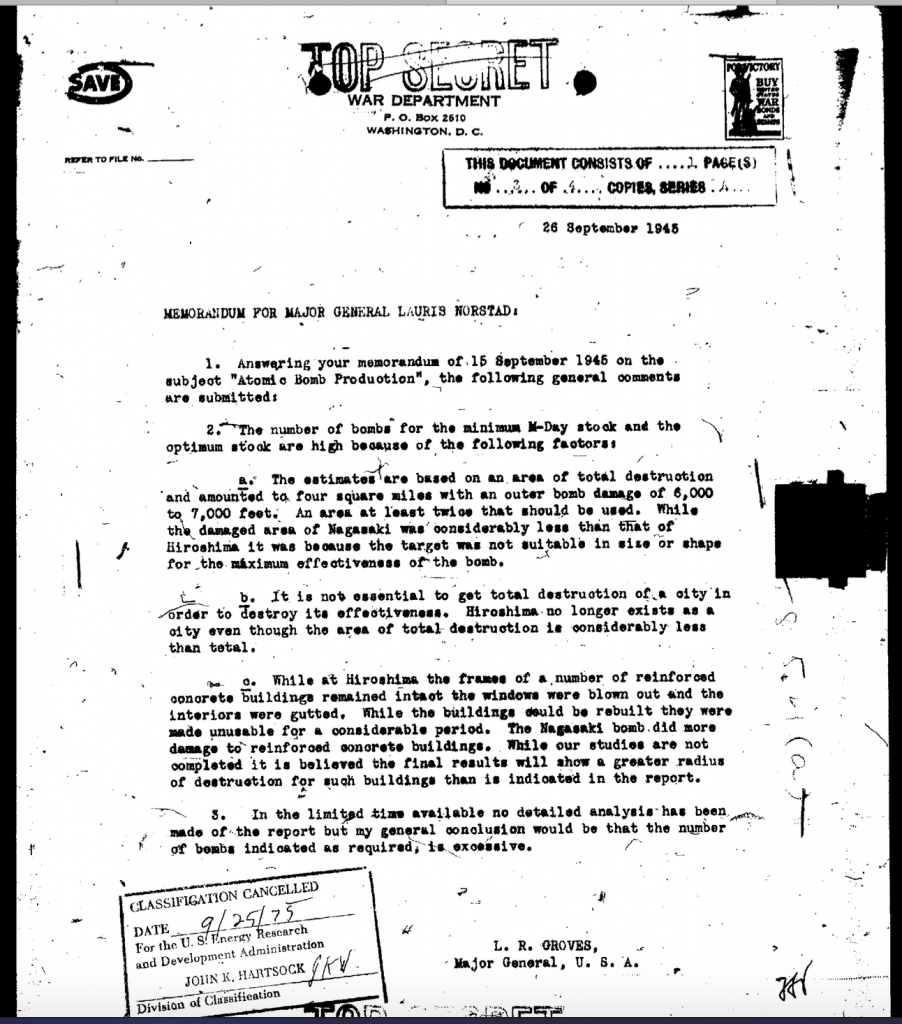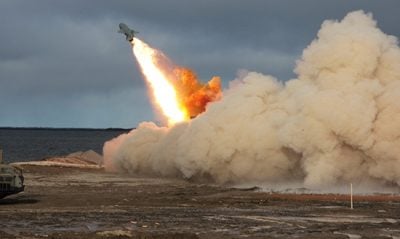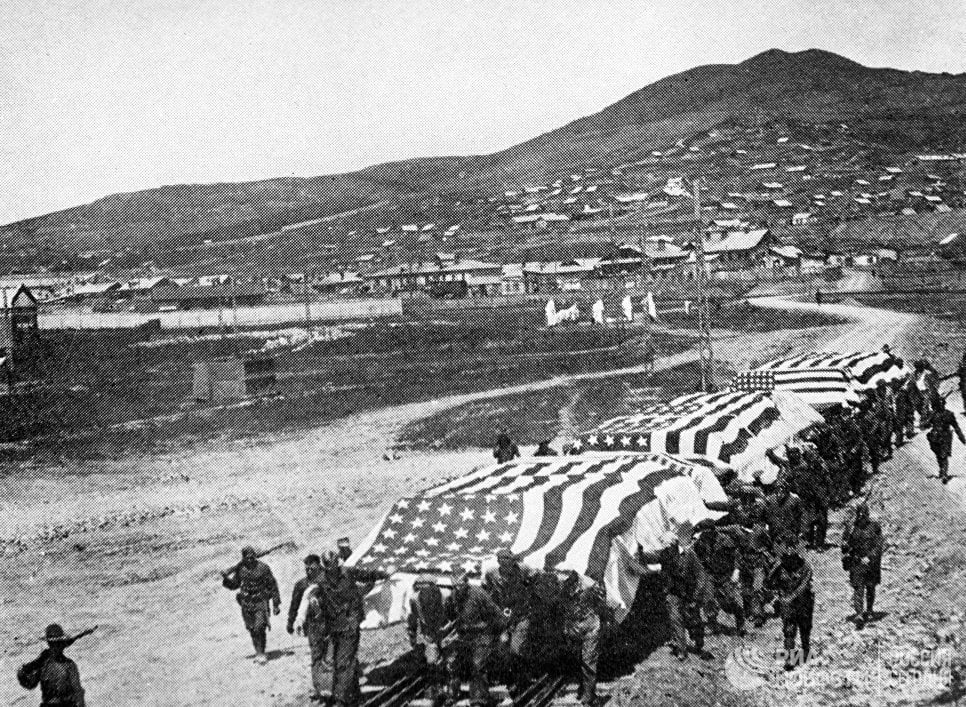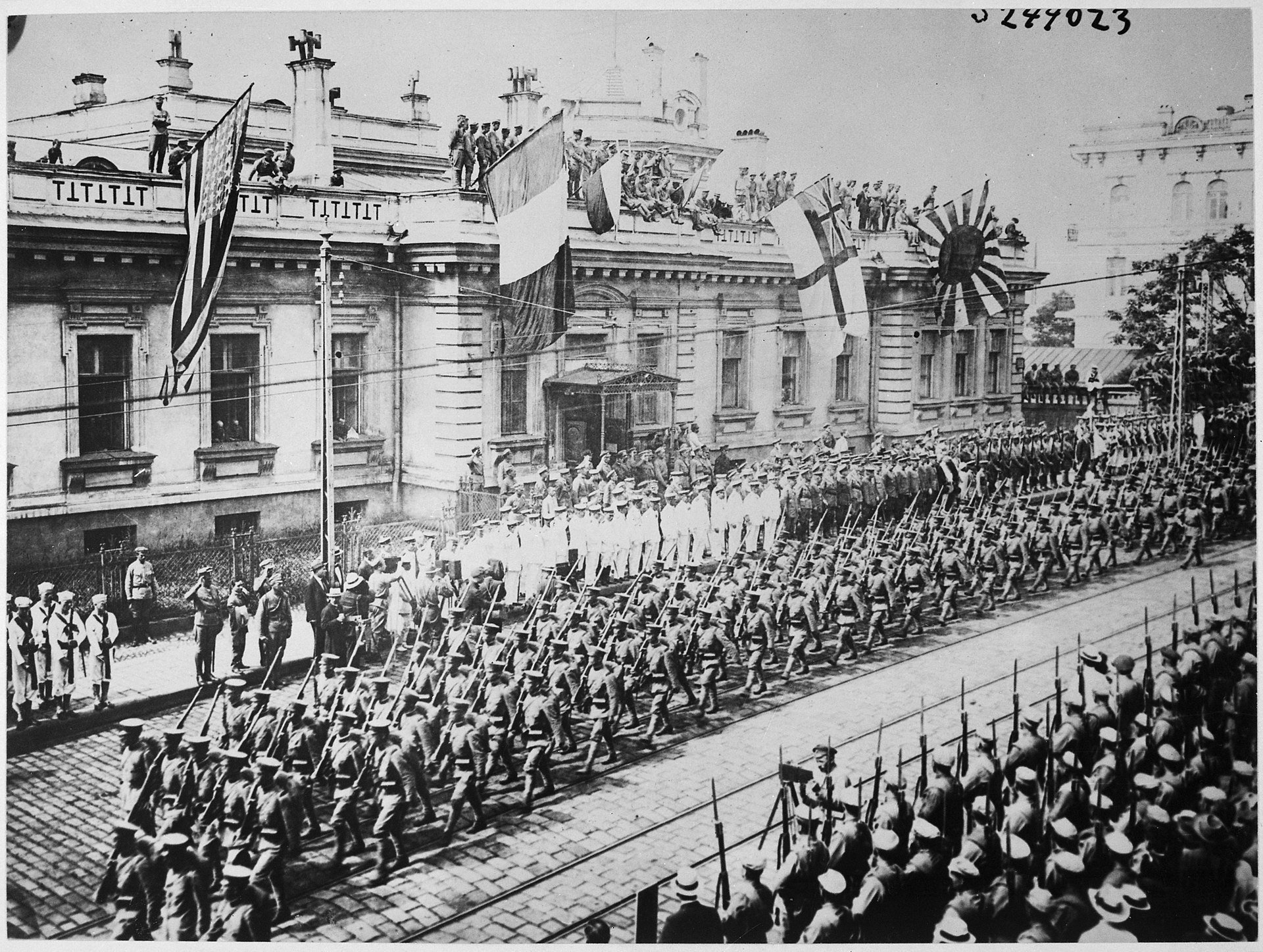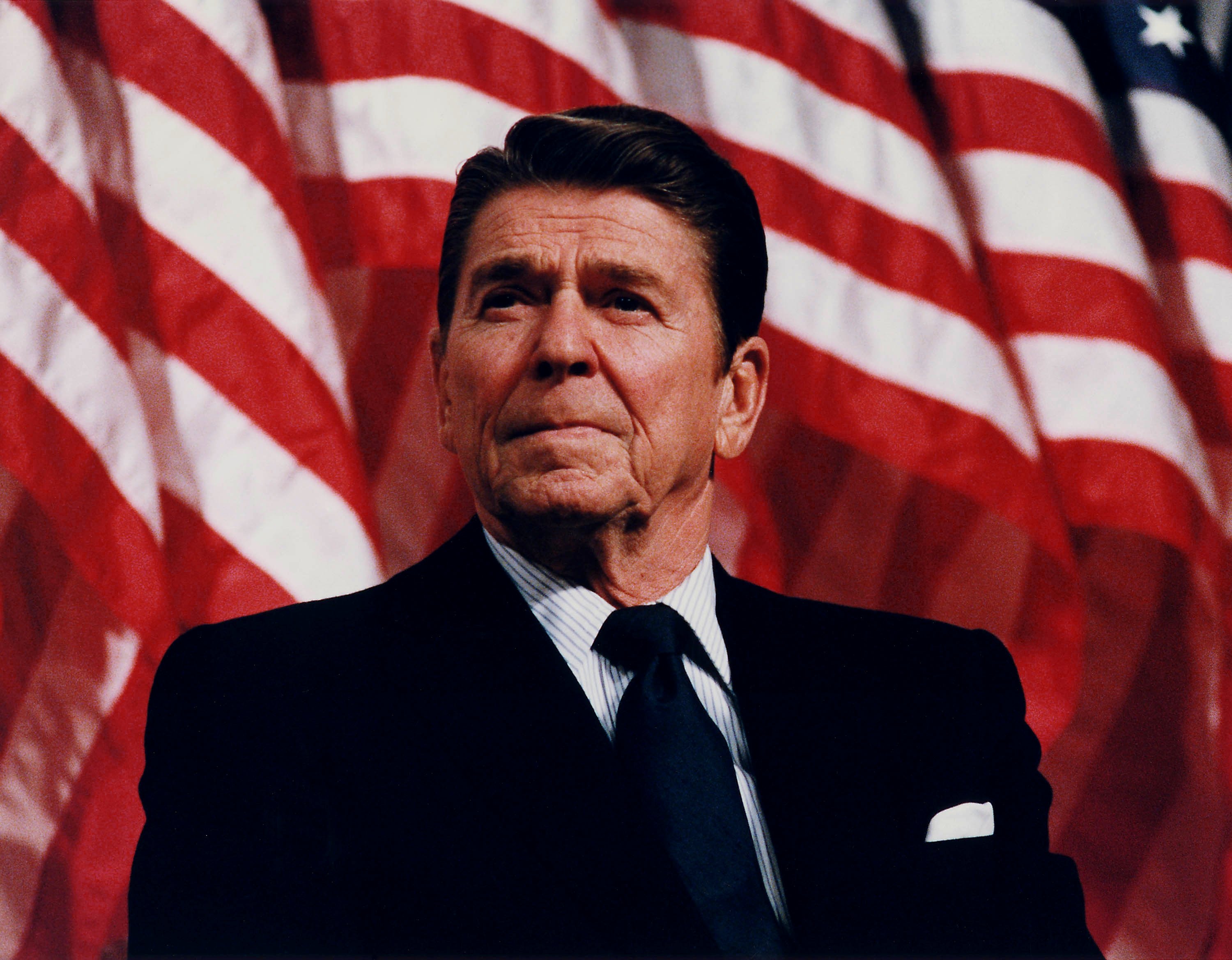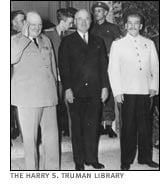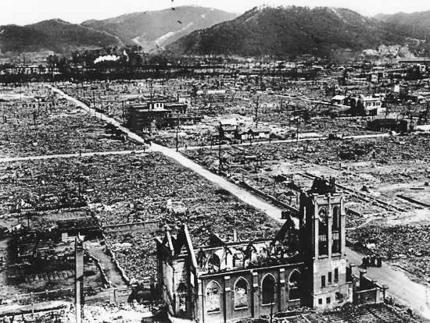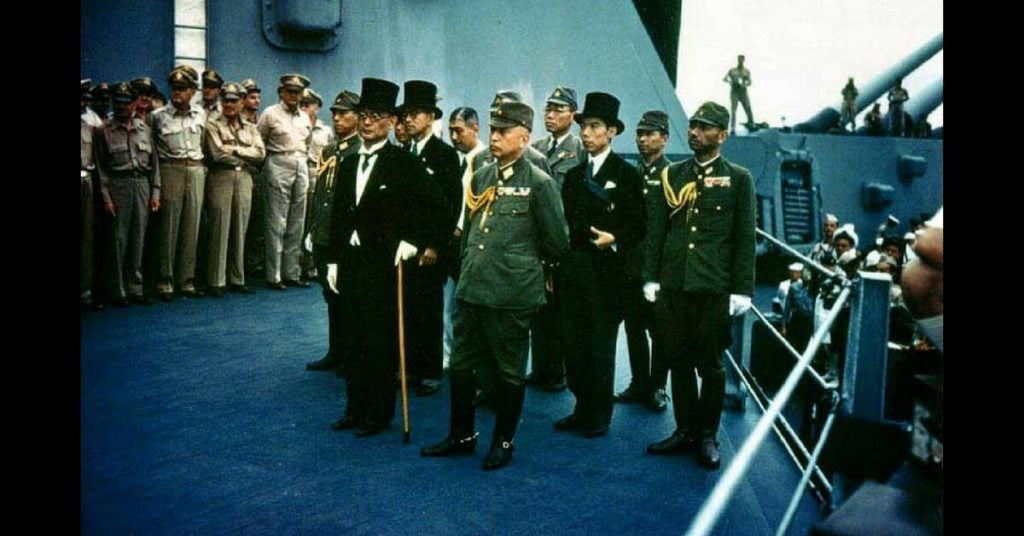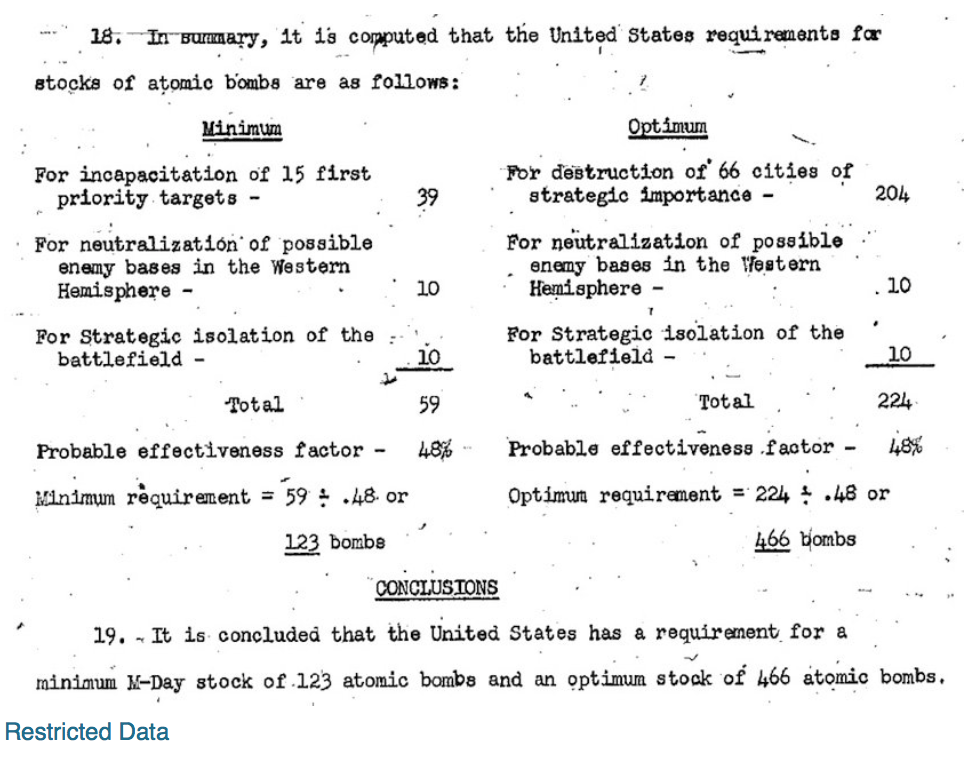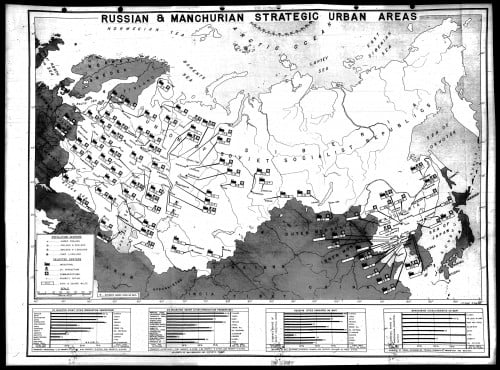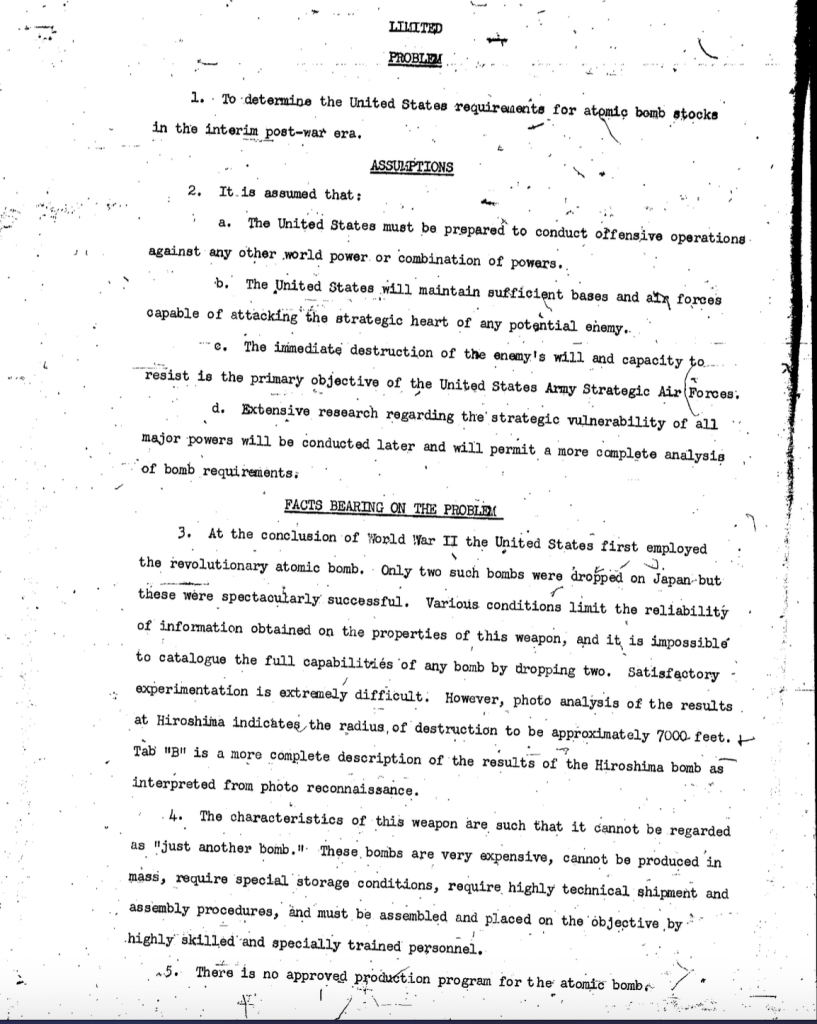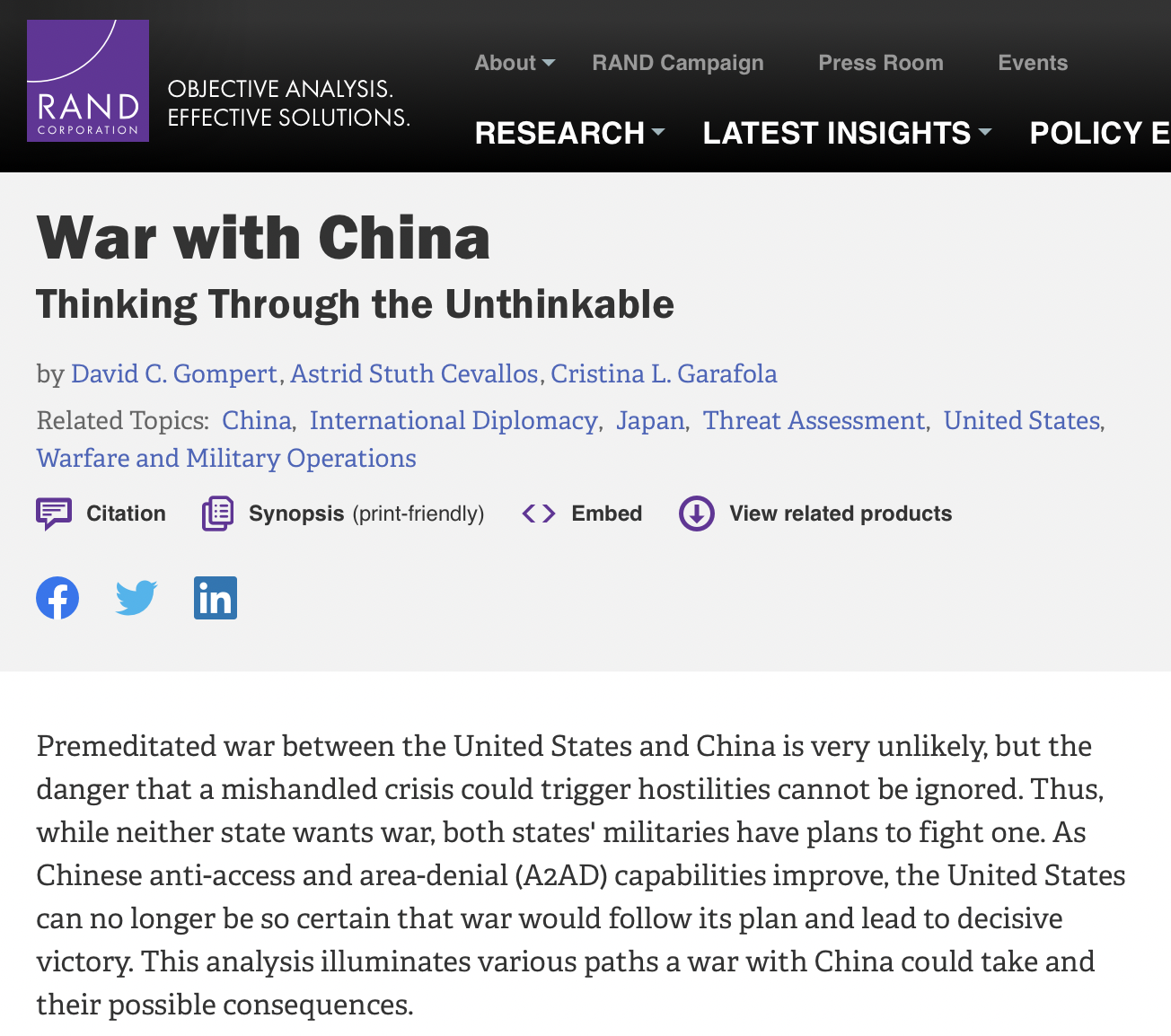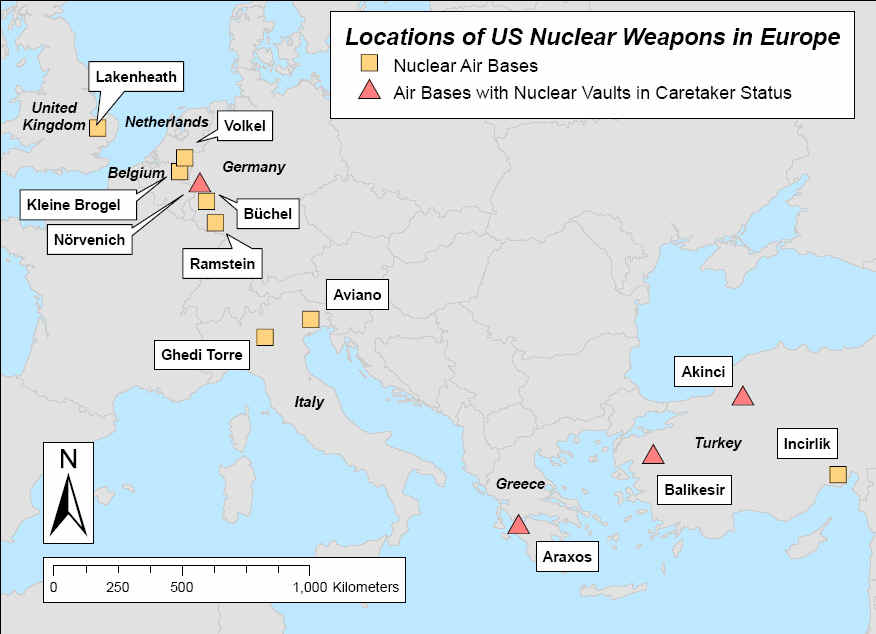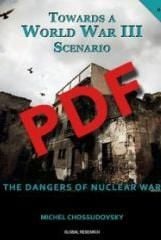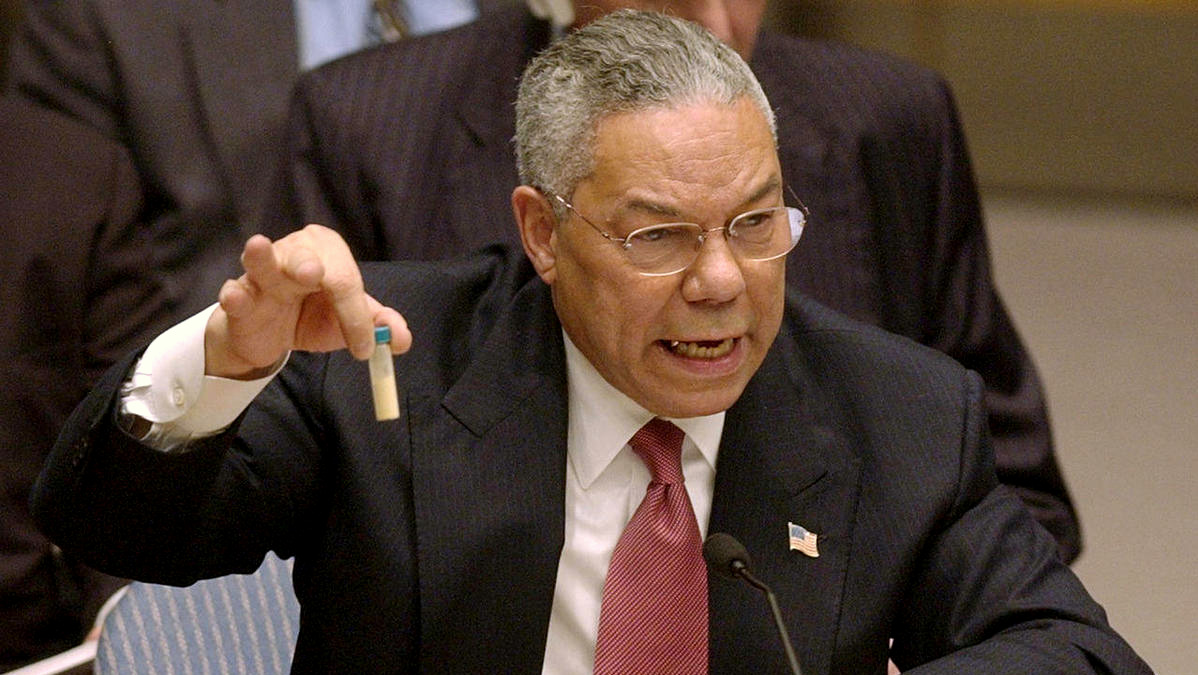Global Research,
Region: Russia and FSU, USA
Theme: Militarization and WMD, US NATO War Agenda
In-depth Report: Nuclear War, UKRAINE REPORT
All Global Research articles can be read in 51 languages by activating the “Translate Website” drop down menu on the top banner of our home page (Desktop version).
To receive Global Research’s Daily Newsletter (selected articles), click here.
Visit and follow us on Instagram at @globalresearch_crg.
This article was first published on March 9, 2022, revised and expanded on October 5, 2022, minor revisions on May 25, 2023.
Introduction
At no point since the first atomic bomb was dropped on Hiroshima on August 6th, 1945, has humanity been closer to the unthinkable. All the safeguards of the Cold War era, which categorized the nuclear bomb as “a weapon of last resort”, have been scrapped.
Let us also recall the unspoken history of America’s doctrine pertaining to the conduct of nuclear war.
Barely six weeks after the bombing of Hiroshima and Nagasaki,the U.S. War Department released a Secret Plan on September 15, 1945 to bomb 66 cities of the Soviet Union with 204 atomic bombs.
The September 1945 Plan was to “Wipe the Soviet Union off the Map” at a time when the US and the USSR were allies. Confirmed by declassified documents, Hiroshima and Nagasaki served as a “Dress Rehearsal” (see historical details and analysis below).
Putin’s February 2022 Statement
Vladimir Putin’s statement on February 21st, 2022 was a response to US threats to use nuclear weapons on a preemptive basis against Russia, despite Joe Biden’s “reassurance” that the US would not be resorting to “A first strike” nuclear attack against an enemy of America:
“Let me [Putin] explain that U.S. strategic planning documents contain the possibility of a so-called preemptive strike against enemy missile systems. And who is the main enemy for the U.S. and NATO? We know that too. It’s Russia. In NATO documents, our country is officially and directly declared the main threat to North Atlantic security. And Ukraine will serve as a forward springboard for the strike.” (Putin Speech, February 21, 2022, emphasis added)
In July 2021, the Biden administration launched its Nuclear Posture Review (NPR) which was formally announced in October 2022.
The 2022 NPR includes what is described as a “nuclear declaratory policy of the United States”.
The 2022 NPR largely confirms the nuclear options developed by the Obama and Bush administrations predicated on the notion of preemptive nuclear war raised in President Putin’s speech.
The underlying US nuclear doctrine consists in portraying nuclear weapons as a means of “self defense” rather than as a “weapon of mass destruction”.
The NPR does not rule out the possibility of a “first strike” nuclear attack against Russia. According to theUS Congress Research Service:
“The NPR [2022] suggests that the United States may use nuclear weapons in circumstances that do not involve potential adversaries’ potential use of nuclear weapons. …The review also asserts that an ‘effective nuclear deterrent is foundational to broader U.S. defense strategy,’ but does not elaborate. (…)”
“Should deterrence fail, ‘the United States would seek to end any conflict at the lowest level of damage possible on the best achievable terms’— language implying that the United States might use nuclear weapons for purposes other than deterrence.” (CRS Reports. US Congress 2022 NPR, emphasis added)
The Privatization of Nuclear War
It should be understood, that there are powerful financial interests behind the NPR which are tied into the $1.3 trillion nuclear weapons program initiated under President Obama.
Although the Ukraine conflict has so-far been limited to conventional weapons coupled with “economic warfare”, the use of a large array of sophisticated WMDs including nuclear weapons is on the drawing board of the Pentagon.
Dangerous narrative: The NPR proposes “increased integration of conventional and nuclear planning”, which consists in categorizing tactical nuclear weapons (e.g. B61-11 and 12) as conventional weapons, to be used on a preemptive basis in the conventional war theater (as a means of self defense)
According to the Federation of American Scientists, the total number of nuclear warheads Worldwide is of the order of 13,000. Russia and the United States “each have around 4,000 warheads in their military stockpiles”.
The Dangers of Nuclear War are Real. Profit Driven. Two Trillion Dollars
Under Joe Biden, public funds allocated to nuclear weapons are slated to increase to 2 trillion by 2030 allegedly as a means to safeguarding peace and national security at taxpayers expense. (How many schools and hospitals could you finance with 2 trillion dollars?):
The United States maintains an arsenal of about 1,700 strategic nuclear warheads deployed on intercontinental ballistic missiles (ICBMs) and submarine-launched ballistic missiles (SLBMs) and at strategic bomber bases. There are an additional estimated 100 non-strategic, or tactical, nuclear weapons at bomber bases in five European countries and about 2,000 nuclear warheads in storage. [see our analysis of B61-11 and B61-12 below]
The Congressional Budget Office (CBO) estimated in May 2021 that the United States will spend a total of $634 billion over the next 10 years to sustain and modernize its nuclear arsenal. (Arms Control)
In this article, I will focus on
- The Post Cold War shift in US Nuclear Doctrine,
- A brief review of the History of US-Russia Relations since World War I,
- An Assessment of the history of nuclear weapons going back to the Manhattan Project initiated in 1939 with the participation of both Canada and the United Kingdom.
Most people in America do not know that the Manhattan Project in the immediate wake of bombing of Hiroshima, Nagasaki in August 1945, was intended to formulate a nuclear attack against the USSR, at a time when the Soviet Union and the U.S. were allies.
What I am referring to is the U.S Blueprint of September 15, 1945 according to which the US War Department planned to drop more than 200 atomic bombs on 66 cities of the Soviet Union. This is not mentioned in the history books. See:
http://blog.nuclearsecrecy.com/wp-content/uploads/2012/05/1945-Atomic-Bomb-Production.pdf
Video: The Dangers of Nuclear War: Michel Chossudovsky
Comments: Link to Odysee
A Note on the History of US-Russia Relations. The Forgotten War of 1918
From a historical standpoint the US and its Allies have been threatening Russia for more than 104 years starting during World War I with the deployment of US and Allied Forces against Soviet Russia on January 12, 1918, (two months following the November 7, 1917 revolution allegedly in support of Russia’s Imperial Army).
The 1918 US-UK Allied invasion of Russia is a landmark in Russian History, often mistakenly portrayed as being part of a Civil War.
It lasted for more than two years involving the deployment of more than 200,000 troops of which 11,000 were from the US, 59,000 from the UK. Japan which was an Ally of Britain and America during World War I dispatched 70,000 troops.
US Troops in Vladivostok, 1918
US Occupation Troops in Vladivostok 1918
US and Allied Troops in Vladivostok in 1918
The Threat of Nuclear War
The US threat of nuclear war against Russia was formulated more than 76 years ago in September 1945, when the US and the Soviet Union were allies. It consisted in a “World War III Blueprint” of nuclear war against the USSR, targeting 66 cities with more than 200 atomic bombs. This diabolical project under the Manhattan Project was instrumental in triggering the Cold War and the nuclear arms race. (See analysis below).
Chronology
1918-1920: The first US and allied forces led war against Soviet Russia with more than 10 countries sending troops to fight alongside the White Imperial Russian army. This happened exactly two months after the October Revolution, on January 12, 1918, and it lasted until the early 1920s.
The Manhattan Project initiated in 1939, with the participation of the UK and Canada. Development of the Atomic Bomb.
Operation Barbarossa, June 1941. Nazi Invasion of the Soviet Union. Standard Oil of New Jersey was selling oil to Nazi Germany.
February 1945: The Yalta Conference. The meeting of Roosevelt, Churchill and Stalin.
“Operation Unthinkable”: A Secret attack plan against the Soviet Union formulated by Winston Churchill in the immediate wake of the Yalta conference. It was scrapped in June 1945.
April 12, 1945: The Potsdam Conference. President Harry Truman and Prime Minister Winston Churchill approve the atomic bombing of Japan.
September 15, 1945: A World War III Scenario formulated by the US War Department: A plan to bomb 66 cities of the Soviet Union with 204 atomic bombs, when the US and USSR were allies. The Secret plan (declassified in 1975) formulated during WWII, was released less than two weeks after the official end of WWII on September 2, 1945
1949: The Soviet Union announces the testing of its nuclear bomb.
Post Cold War Doctrine: “Preemptive Nuclear War”
The Doctrine of Mutually Assured Destruction (MAD) of the Cold War Era no longer prevails. It was replaced at the outset of the George W. Bush Administration with the Doctrine of Preemptive Nuclear War, namely the use of nuclear weapons as a means of “self-defense” against both nuclear and non-nuclear weapons states.
In early 2002, the text of George W. Bush’s Nuclear Posture Review had already been leaked, several months prior to the release of the September 2002 National Security Strategy (NSS) which defined, “Preemption” as:
“the anticipatory use of force in the face of an imminent attack”.
Namely as an act of war on the grounds of self-defense
The MAD doctrine was scrapped. The 2001 Nuclear Posture Review not only redefined the use of nuclear weapons, so-called tactical nuclear weapons or bunker buster bombs (mini-nukes) could henceforth be used in the conventional war theater without the authorization of the Commander in Chief, namely the President of the United States.
Seven countries were identified in the 2001 NPR (adopted in 2002) as potential targets for a preemptive nuclear attack
Discussing “requirements for nuclear strike capabilities,” the report lists Iran, Iraq, Libya, North Korea, and Syria as “among the countries that could be involved in immediate, potential, or unexpected contingencies.” …
Three of these countries (Iraq, Libya and Syria) have since then been the object of US-led wars. The 2001 NPR also confirmed continued nuclear war preparations against China and Russia.
“The Bush review also indicates that the United States should be prepared to use nuclear weapons against China, citing “the combination of China’s still developing strategic objectives and its ongoing modernization of its nuclear and non-nuclear forces.”
“Finally, although the review repeats Bush administration assertions that Russia is no longer an enemy, it says the United States must be prepared for nuclear contingencies with Russia and notes that, if “U.S. relations with Russia significantly worsen in the future, the U.S. may need to revise its nuclear force levels and posture.” Ultimately, the review concludes that nuclear conflict with Russia is “plausible” but “not expected.” [that. was back in 2002] ( Arms Control) emphasis added.
The Privatization of Nuclear War
With tensions growing in major regions of the World, a new generation of nuclear weapons technology was unfolding making nuclear warfare a very real prospect. And with very little fanfare, the US had embarked on the privatization of nuclear war under a first-strike “preemptive” doctrine. This process went into full swing in the immediate wake of the 2001 Nuclear Posture Review (2001 NPR) adopted by the US Senate in 2002.
On August 6, 2003, on Hiroshima Day, commemorating when the first atomic bomb was dropped on Hiroshima (August 6 1945), a secret meeting was held behind closed doors at Strategic Command Headquarters at the Offutt Air Force Base in Nebraska. Senior executives from the nuclear industry and the military industrial complex were in attendance.
This mingling of defense contractors, scientists and policy-makers was not intended to commemorate Hiroshima. The meeting was intended to set the stage for the development of a new generation of “smaller”, “safer” and “more usable” nuclear weapons, to be used in the “in-theater nuclear wars” of the 21st Century.”
“Nuclear war has become a multibillion dollar undertaking, which fills the pockets of US defense contractors. What is at stake is the outright “privatization of nuclear war”.
Nuclear War against both China and Russia is contemplated
Russia is tagged as “Plausible” but “Not Expected”. That was back in 2002.
Today at the height of the Ukraine war, a Preemptive Nuclear attack against Russia is on the drawing of the Pentagon. That does not however mean that it will be implemented.
A Nuclear War Cannot be Won?
We recall Reagan’s historic statement: “A nuclear war cannot be won and must never be fought. The only value in our two nations possessing nuclear weapons is to make sure they will never be used.”
Nonetheless, there are powerful voices and lobby groups within the US establishment and the Biden administration that are convinced that “a nuclear war is winnable”.
Flashback to Inter-War Period: Wall Street Finances Hitler’s Election Campaign
According to Yuri Robsov, Wall Street and the Rockefellers were funding Germany’s war machine as well as Adolf Hitler’s election campaign:
American cooperation with the German military-industrial complex was so intense and pervasive that by 1933 the key sectors of German industry and large banks such as Deutsche Bank, Dresdner Bank, Danat-Bank (Darmstädter und Nationalbank), etc. were under the control of American financial capital.
The political force that was intended to play a crucial role in Anglo-American plans was being simultaneously prepared. We are talking about the funding of the Nazi party and Adolf Hitler personally.
On January 4th, 1932, a meeting was held between British financier Montagu Norman (Governor of the Bank of England), Adolf Hitler and Franz Von Papen (who became Chancellor a few months later in May 1932) At this meeting, an agreement on the financing of the Nationalsozialistische Deutsche Arbeiterpartei (NSDAP or Nazi Party) was reached.
This meeting was also attended by US policy-makers and the Dulles brothers, something which their biographers do not like to mention.
A year later, on January 14th, 1933, another meeting was held between Adolf Hitler, Germany’s Financier Baron Kurt von Schroeder, Chancellor Franz von Papen and Hitler’s Economic Advisor Wilhelm Keppler took place, where Hitler’s program was fully approved.
It was here that they finally resolved the issue of the transfer of power to the Nazis, and on the 30th of January 1933 Hitler became Chancellor. The implementation of the fourth stage of the strategy thus begun.
World War II: “Operation Barbarossa”
There is ample evidence that both the US and its British ally were intent upon Nazi Germany winning the war on the Eastern Front with a view to destroying the Soviet Union:
.
“Stalin and his entourage’s growing suspicions, that the Anglo-American powers hoped the Nazi-Soviet War would last for years, were based on well-founded concerns. This desire had already been expressed in part by Harry S. Truman, future US president, hours after the Wehrmacht had invaded the Soviet Union.
Truman, then a US Senator, said he wanted to see the Soviets and Germans “kill as many as possible” between themselves, an attitude which the New York Times later called “a firm policy”. The Times had previously published Truman’s remarks on 24 June 1941, and as a result his views would most likely not have escaped the Soviets’ attention. (Shane Quinn, Global Research, March 2022)
Hitler’s Operation Barbarossa initiated in June 1941 would have failed from the very outset had it not been for the support of Standard Oil of New Jersey (owned by the Rockefellers) which routinely delivered ample supplies of oil to the Third Reich. While Germany was able to transform coal into fuel, this synthetic production was insufficient. Moreover, Romania’s Ploesti oil resources (under Nazi control until 1944) were minimal. Nazi Germany largely depended on oil shipments from US Standard Oil.
.
Trading with the Enemy legislation (1917) officially implemented following America’s entry into World War II did not prevent Standard Oil of New Jersey from selling oil to Nazi Germany. This despite the Senate 1942 investigation of US Standard Oil.
While direct US oil shipments were curtailed, Standard Oil would sell US oil through third countries. US oil was shipped to occupied France (officially via Switzerland, and from France it was shipped to Germany: “… The shipments went through Spain, Vichy France’s colonies in the West Indies, and Switzerland.”
Without those oil shipments instrumented by Standard Oil and the Rockefellers, Nazi Germany would not have been able to implement its military agenda. Without fuel, the Third Reich’s eastern front under Operation Barbarossa would most probably not have taken place, saving millions of lives. The Western front including the military occupation of France, Belgium and The Netherlands would no doubt also have been affected.
The USSR actually won the war against Nazi Germany, with 27 million deaths, which in part resulted from the blatant violation of Trading with the Enemy by Standard Oil.
.
“Operation Unthinkable”: A World War III Scenario Formulated During World War II
.
A World War III scenario against the Soviet Union had already been envisaged in early 1945, under what was called Operation Unthinkable, to be launched prior to the official end of World War II on September 2, 1945.
.
Roosevelt, Churchill and Stalin met at Yalta in early February 1945 largely with a view to negotiating the post war occupation of Germany and Japan.
.
Video: Yalta Conference
.
.
Meanwhile in the wake of the Yalta Conference, Winston Churchill had contemplated a Secret Plan to wage war against the Soviet Union: .
.
“If you thought the Cold War between East and West reached its peak in the 1950s and 1960s, then think again. 1945 was the year when Europe was the crucible for a Third World War.
.
The plan called for a massive Allied assault on 1 July 1945 by British, American, Polish and German – yes German – forces against the Red Army. They aimed to push them back out of Soviet-occupied East Germany and Poland, give Stalin and bloody nose, and force him to re-consider his domination of East Europe. … Eventually in June 1945 Churchill’s military advisors cautioned him against implementing the plan, but it still remained a blueprint for a Third World War. …The Americans had just successfully tested an atomic bomb, and there was now the final temptation of obliterating Soviet centres of population”
.
Churchill’s “Operation Unthinkable” against Soviet Forces in Eastern Europe (see above) was abandoned in June 1945.
During his mandate as Prime Minister (1940-45), Churchill had supported the Manhattan Project. He was a protagonist of nuclear war against the Soviet Union, which had been contemplated under the Manhattan project as early as 1942, when the US and the Soviet Union were allies against Nazi Germany.
A Blueprint for a Third World War using nuclear weapons against 66 major urban areas of the Soviet Union was officially formulated on September 15, 1945 by the US War Department (see section below).
The Potsdam Conference
Vice President Harry S. Truman was sworn in as president of the United States on April 12, 1945, after the death of Franklin D. Roosevelt, who died unexpectedly of a cerebral hemorrhage.
.
At the Potsdam meetings, President Truman entered into discussions (July 1945) with Stalin and Churchill: (see image right). The discussions were of a different nature to those of Yalta, specifically with regard to both Truman and Churchill who were both in favour of nuclear warfare:
.
“[British] PM [Churchill] and I ate alone. Discussed Manhattan (it is a success). Decided to tell Stalin about it. Stalin had told PM [Churchill] of telegram from Jap emperor asking for peace. Stalin also read his answer to me. It was satisfactory. Believe Japs will fold up before Russia comes in. I am sure they will when Manhattan appears over their homeland. I shall inform Stalin about it at an opportune time. (Truman Diary, July 17, 1945, emphasis added)
What this statement from Truman’s Diary confirms is that Japan would “fold up” and surrender to the US “before Russia comes in”. Ultimately this was the objective of the atomic bombs dropped on Hiroshima and Nagasaki.
While Stalin was casually informed by Truman regarding the Manhattan Project in July 1945, sources suggest that the Soviet Union was aware of the Manhattan Project as early as 1942. Did Truman tell Stalin that the atom bomb was intended for Japan?
“We met at 11.00am. today.[ That is, Stalin, Churchill and the US president].
But I had a most important session [without Stalin?] with Lord Mountbatten and General Marshall [US joint Chiefs of Staff] before that. [This meeting was not part of the official agenda] We have discovered the most terrible bomb in the history of the world. It may be the fire destruction prophesied in the Euphrates Valley era, after Noah and his fabulous ark. Anyway, we think we have found the way to cause a disintegration of the atom. An experiment in the New Mexico desert was startling – to put it mildly. Thirteen pounds of the explosive caused a crater six hundred feet deep and twelve hundred feet in diameter, knocked over a steel tower a half mile away, and knocked men down ten thousand yards away. The explosion was visible for more than two hundred miles and audible for forty miles and more.
This weapon is to be used against Japan between now and August 10th.I have told the secretary of war, Mr Stimson, to use it so that military objectives and soldiers and sailors are the target and not women and children. Even if Japs are savages, ruthless, merciless and fanatic, we as the leader of the world for the common welfare cannot drop this terrible bomb on the old capital or the new. He and I are in accord. The target will be a purely military one and we will issue a warning statement asking the Japs to surrender and save lives. I’m sure they will not do that, but we will have given them the chance. It is certainly a good thing for the world that Hitler’s crowd or Stalin’s did not discover this atomic bomb. It seems to be the most terrible thing ever discovered, but it can be made the most useful.” (Truman’s Diary, Potsdam meeting on July 18, 1945)
The discussion on the Manhattan Project does not appear in the official minutes of the meetings.
The Infamous “WW III Blueprint” to Wage a Nuclear Attack against the Soviet Union (September 15, 1945)
Barely two weeks after the official end of World War II (September 2, 1945), the US War Department issued a directive (September 15, 1945) to “Erase the Soviet Union off the Map” (66 cities with 204 atomic bombs), when the US and USSR were allies, confirmed by declassified documents. (For further details see Chossudovsky, 2017)
According to a secret (declassified) document dated September 15, 1945, “the Pentagon had envisaged blowing up the Soviet Union with a coordinated nuclear attack directed against major urban areas.
All major cities of the Soviet Union were included in the list of 66 “strategic” targets. The tables below categorize each city in terms of area in square miles and the corresponding number of atomic bombs required to annihilate and kill the inhabitants of selected urban areas.
Six atomic bombs were to be used to destroy each of the larger cities including Moscow, Leningrad, Tashkent, Kiev, Kharkov, Odessa.
The Pentagon estimated that a total of 204 atomic bombs would be required to “Wipe the Soviet Union off the Map”. The targets for a nuclear attack consisted of sixty-six major cities.
One single atomic bomb dropped on Hiroshima resulted in the immediate death of 100,000 people in the first seven seconds. Imagine what would have happened if 204 atomic bombs had been dropped on major cities of the Soviet Union as outlined in a secret U.S. plan formulated during the Second World War.
Hiroshima in the wake of the atomic bomb attack, 6 August 1945
The document outlining this diabolical military agenda had been released in September 1945, barely one month after the bombing of Hiroshima and Nagasaki (6 and 9 August, 1945) and two years before the onset of the Cold War (1947).
The secret plan dated September 15, 1945 (two weeks after the surrender of Japan on September 2, 1945 aboard the USS Missouri, see image below) , however, had been formulated at an earlier period, namely at the height of World War II, at a time when America and the Soviet Union were close allies.
The Manhattan project was launched in 1939, two years prior to America’s entry into World War II in December 1941. The Kremlin was fully aware of the secret Manhattan project as early as 1942.
Hiroshima and Nagasaki: Dress Rehearsal for Planned Nuclear Attack against the Soviet Union
Were the August 1945 Hiroshima and Nagasaki attacks used by the Pentagon to evaluate the viability of a much larger attack on the Soviet Union consisting of more than 204 atomic bombs? The key documents to bomb 66 cities of the Soviet Union (15 September 1945) were finalized 5-6 weeks after the Hiroshima and Nagasaki bombings (6, 9 August 1945):
“On September 15, 1945 — just under two weeks after the formal surrender of Japan and the end of World War II — Norstad sent a copy of the estimate to General Leslie Groves, still the head of the Manhattan Project, and the guy who, for the short term anyway, would be in charge of producing whatever bombs the USAAF might want. As you might guess, the classification on this document was high: “TOP SECRET LIMITED,” which was about as high as it went during World War II. (Alex Wellerstein, The First Atomic Stockpile Requirements (September 1945)
The Kremlin was aware of the 1945 plan to bomb sixty-six Soviet cities.
The documents confirm that the US was involved in the “planning of genocide” against the Soviet Union.
Let’s cut to the chase. How many bombs did the USAAF request of the atomic general, when there were maybe one, maybe twobombs worth of fissile material on hand? At a minimum they wanted 123. Ideally, they’d like 466. This is just a little over a month after the bombings of Hiroshima and Nagasaki.
Of course, in true bureaucratic fashion, they provided a handy-dandy chart (Alex Wellerstein, op. cit)
http://blog.nuclearsecrecy.com/wp-content/uploads/2012/05/1945-Atomic-Bomb-Production.pdf
Soviet Cities to be targeted with Atomic Bombs
Map of 66 Soviet Urban Strategic Areas to be Bombed with 206 atomic Bombs (Declassified September 1945)
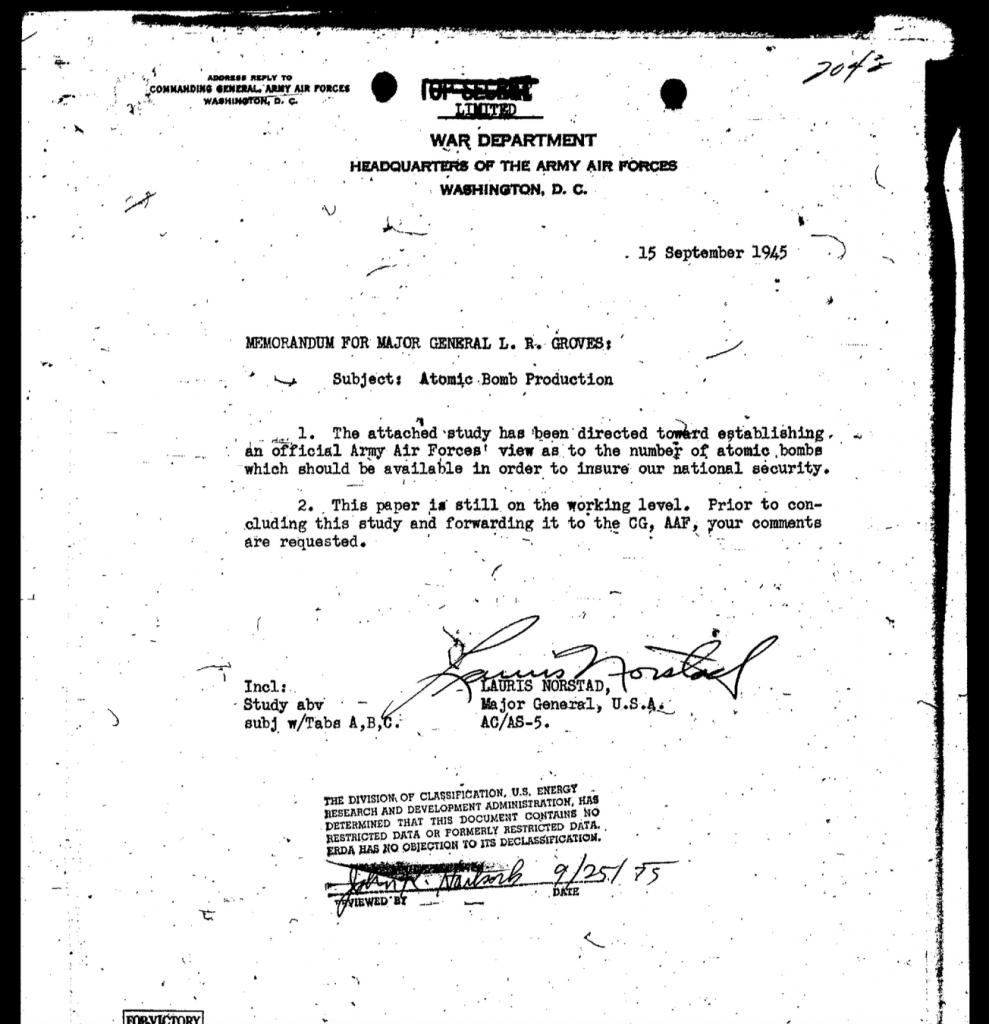
Access all the documents of the September 15, 1945 Operation
The Nuclear Arms Race
Central to our understanding of the Cold War which started (officially) in 1947, Washington’s September 1945 plan to bomb 66 cities into smithereens played a key role in triggering the nuclear arms race.
The Soviet Union was threatened and developed its own atomic bomb in 1949 in response to 1942 Soviet intelligence reports on the Manhattan Project.
While the Kremlin knew about these plans to “Wipe out” the USSR, the broader public was not informed because the September 1945 documents were of course classified. They were declassified 30 years later in September 1975
Today, neither the September 1945 plan to blow up the Soviet Union nor the underlying cause of the nuclear arms race are acknowledged. The Western media has largely focussed its attention on the Cold War US-USSR confrontation. The plan to annihilate the Soviet Union dating back to World War II and the infamous Manhattan project are not mentioned.
Washington’s Cold War nuclear plans are invariably presented in response to so-called Soviet threats, when in fact it was the U.S. plan released in September 1945 (formulated at an earlier period at the height of World War II) to wipe out the Soviet which motivated Moscow to develop its nuclear weapons capabilities.
The assessment of the Bulletin of the Atomic Scientists mistakenly blamed and continue to blame the Soviet Union for having launched the nuclear arms race in 1949, four years after the release of the September 1945 US Secret Plan to target 66 major Soviet cities with 204 nuclear bombs:
“1949: The Soviet Union denies it, but in the fall, President Harry Truman tells the American public that the Soviets tested their first nuclear device, officially starting the arms race. “We do not advise Americans that doomsday is near and that they can expect atomic bombs to start falling on their heads a month or year from now,” the Bulletin explains. “But we think they have reason to be deeply alarmed and to be prepared for grave decisions.” (Timeline of the Doomsday Clock, Bulletin of Atomic Scientists, 2017)
IMPORTANT: Had the US decided NOT to develop nuclear weapons for use against the Soviet Union, the nuclear arms race would not have taken place.
Neither The Soviet Union nor the People’s Republic of China would have developed nuclear capabilities as a means of “Deterrence” agains the US which had already formulated plans to annihilate the Soviet Union.
The Soviet Union lost 26 million people during World War II.
The Cold War Era
The Nuclear Arms Race was the direct result of America’s September 1945 plan to “blow up the Soviet Union”, formulated by the US War Department.
The Soviet Union tested its first nuclear bomb in 1949. Without the Manhattan Project and the War Department’s September 15, 1945 “World War III Blueprint”, the Arms Race would not have occurred.
The September 15, 1945 War Department set the stage for numerous plans to wage World War III against Russia and China:
The Cold War List of 1200 Targeted Cities
This initial 1945 list of sixty-six cities was updated in the course of the Cold War (1956) to include some 1200 cities in the USSR and the Soviet block countries of Eastern Europe (see declassified documents below). The bombs slated for use were more powerful in terms of explosive capacity than those dropped on Hiroshima and Nagasaki.
Excerpt from list of 1200 Soviet cities targeted for nuclear attack in alphabetical order. National Security Archive, op. cit.
“According to the 1956 Plan, H-Bombs were to be Used Against Priority “Air Power” Targets in the Soviet Union, China, and Eastern Europe. Major Cities in the Soviet Bloc, Including East Berlin, Were High Priorities in “Systematic Destruction” for Atomic Bombings. (William Burr, U.S. Cold War Nuclear Attack Target List of 1200 Soviet Bloc Cities “From East Germany to China”, National Security Archive Electronic Briefing Book No. 538, December 2015
Source: National Security Archive
During the Cold War, the doctrine of Mutually Assured Destruction (MAD) prevailed, namely that the use of nuclear weapons would result in “the destruction of both the attacker and the defender”.
In the post Cold war era, US nuclear doctrine was redefined. “Offensive” military actions using nuclear warheads are now described as acts of “self-defense”.
Humanitarian Nuclear Warfare under Joe Biden

US-NATO led military Interventions (Yugoslavia, Afghanistan, Iraq, Libya, Syria, Yemen) which have resulted in millions of civilian casualties are heralded as Humanitarian Wars, as a means to ensuring Peace.
This is also the discourse underlying US-NATO intervention in Ukraine.
“I just want you to know that, when we talk about war, we’re really talking about peace” said George W. Bush
“Humanitarian Nuclear Bombs”
This kind of window dressing of “humanitarian nuclear bombs” is not only embedded into Joe Biden’s foreign policy agenda, it constitutes the mainstay of US military doctrine, namely the so-called Nuclear Posture Review, not to mention the 1.2 trillion nuclear weapons program initiated during the Obama administration.
The B61 Mini-nukes Deployed in Western Europe
The latest B61-12 “mini nuke” is slated to be deployed in Western Europe, aimed at Russia and the Middle East (replacing the existing of B61 nuclear bombs).
B-61-12 is portrayed as a “more usable” “low yield” “humanitarian bomb” “‘harmless to civilians”. That’s the ideology. The reality is “Mutual Assured Destruction” (MAD).
The B61-12 has a maximum yield of 50 kilotons which is more than three times that of a Hiroshima bomb (15 kilotons) which resulted in excess of 100,000 deaths in matter of minutes.
If a preemptive attack using a so-called mini nuke were to succeed, targeted against Russia or Iran, this could potentially lead humanity into a WW III scenario. Of course these details are not highlighted in mainstream media reports.
F-15E Eagle Strike Eagle Fighter for the Delivery of the B-61-12
Low Yield Nukes: Humanitarian Warfare Goes Live
And when the characteristics of this “harmless” low yield nuclear bomb are inserted into the military manuals, “humanitarian warfare” goes live: “It’s low yield and safe for civilians, let’s use it” [paraphrase].
The US arsenal of B61 nuclear bombs directed against the Middle East are currently located in the military bases of 5 non-nuclear states (Italy, Germany, the Netherlands, Belgium, Turkey). The command structure pertaining to the B61-12 is yet to be confirmed. The situation with regard to Turkey’s Incirlik base is unclear.
Upholding WMDs as Instruments of Peace is a Dangerous Gimmick
Throughout History, “Mistakes” have Played a Key Role
We are at a Dangerous Crossroads. There is no Real Anti-war Movement in Sight.
Why? Because War is Good for Business!
And the powers of Big Money which are behind US-NATO led wars control both the anti-war movement as well as the media coverage of US led wars. That’s nothing new. It goes back to the so-called Soviet-Afghan War (1979-) which was spearheaded by US National Security Advisor Zbigniew Brzezinski.
Through their “philanthropic” foundations (Ford, Rockefeller, Soros et al) the financial elites have over the years channelled millions of dollars into financing so-called “progressive movements” including the World Social Forum (WSF)
It’s Called “Manufactured Dissent”: Big Money is also behind numerous coups d’état and color revolutions.
Meanwhile, important sectors of the Left including committed anti-war activists have endorsed the Covid mandates without verifying or acknowledging the facts and the history of the so-called pandemic.
It should be understood that the lockdown policies as well as the Covid-19 “Killer Vaccine” are an integral part of the financial elite’s “broader arsenal”. They are instruments of submission and tyranny.
The World Economic Forum’s Great Reset is an integral part of the World War III scenario which consists in establishing through military and non military means an imperial system of “global governance”.
The same powerful financial interests (Rockefeller, Rothschild, BlackRock, Vanguard, et al) which are supportive of the US-NATO military agenda are firmly behind the “Covid Pandemic Op”.
***
The Historic Battle for Peace and Democracy. A Third World War Spells the End of Humanity?
Relentless War Propaganda and Media Disinformation Is the Driving Force. It Must be Confronted.
Is “Peaceful Coexistence” and Diplomacy between Russia and the U.S. an Option?
“War is Good for Business”: Corrupt Governments which Uphold the Interests of Big Money Must be Challenged
“Towards a World War III Scenario: The Dangers of Nuclear War”
by Michel Chossudovsky
Available to order from Global Research!
ISBN Number: 978-0-9737147-5-3
Year: 2012
Pages: 102
PDF Edition: $6.50 (sent directly to your email account!)
Michel Chossudovsky is Professor of Economics at the University of Ottawa and Director of the Centre for Research on Globalization (CRG), which hosts the critically acclaimed website www.globalresearch.ca . He is a contributor to the Encyclopedia Britannica. His writings have been translated into more than 20 languages.
Reviews
“This book is a ‘must’ resource – a richly documented and systematic diagnosis of the supremely pathological geo-strategic planning of US wars since ‘9-11’ against non-nuclear countries to seize their oil fields and resources under cover of ‘freedom and democracy’.”
–John McMurtry, Professor of Philosophy, Guelph University
“In a world where engineered, pre-emptive, or more fashionably “humanitarian” wars of aggression have become the norm, this challenging book may be our final wake-up call.”
-Denis Halliday, Former Assistant Secretary General of the United Nations
Michel Chossudovsky exposes the insanity of our privatized war machine. Iran is being targeted with nuclear weapons as part of a war agenda built on distortions and lies for the purpose of private profit. The real aims are oil, financial hegemony and global control. The price could be nuclear holocaust. When weapons become the hottest export of the world’s only superpower, and diplomats work as salesmen for the defense industry, the whole world is recklessly endangered. If we must have a military, it belongs entirely in the public sector. No one should profit from mass death and destruction.
–Ellen Brown, author of ‘Web of Debt’ and president of the Public Banking Institute
The original source of this article is Global Research
Copyright © Prof Michel Chossudovsky, Global Research, 2023
Filed under: China, Hitler, Russia, US-led NATO Alliance, USA, USSR, Vladimir Putin, WMD | Tagged: Biden's Foreign Policy, Bush, Hiroshima, Nagasaki, Nazi Germany, Obama-era warmongers, Operation Barbarossa, Preemptive nuclear war, Prof Michel Chossudovsky, Putin doctrine, Rockefellers, US Nuclear Doctrine, US-led ‘War of Terror‘, WWI, WWIII, Yalta Conference | Comments Off on “Preemptive Nuclear War”: The Historic Battle for Peace and Democracy. A Third World War Threatens the Future of Humanity





